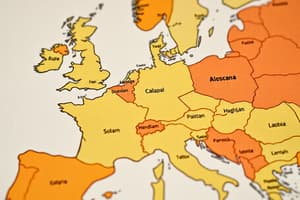Podcast
Questions and Answers
What major change occurred after World War II?
What major change occurred after World War II?
- Increase in income inequality
- Emphasis on individualism
- Environmental degradation
- Rise of welfare states (correct)
What is the primary goal of community development?
What is the primary goal of community development?
- Neglecting poverty alleviation
- Enhancing the quality of life for residents (correct)
- Ignoring education and health issues
- Promoting income inequality
Which is NOT an issue addressed by community development strategies?
Which is NOT an issue addressed by community development strategies?
- Income inequality
- Public spaces
- Space exploration programs (correct)
- Unemployment
What do successful community development initiatives aim to foster?
What do successful community development initiatives aim to foster?
Why is it important to understand historical communities?
Why is it important to understand historical communities?
What valuable insights can the study of communities provide?
What valuable insights can the study of communities provide?
Which of the following is NOT an example of a historical community?
Which of the following is NOT an example of a historical community?
What was a significant societal change that influenced the evolution of communities?
What was a significant societal change that influenced the evolution of communities?
Which of the following factors could have influenced the formation of historical communities?
Which of the following factors could have influenced the formation of historical communities?
What was a characteristic of medieval feudal communities in Europe?
What was a characteristic of medieval feudal communities in Europe?
What is a key factor that has influenced the development of communities over time?
What is a key factor that has influenced the development of communities over time?
Which of the following statements about historical communities is NOT true?
Which of the following statements about historical communities is NOT true?
Flashcards are hidden until you start studying
Study Notes
Communities in Time: Historical Development and Change
Communities have evolved significantly throughout history, reflecting societal transitions and transformations. Understanding these shifts provides insight into how societies have changed and adapted over time. Let's explore three key subtopics within this broader theme: historical communities, societal changes over time, and community development.
Historical Communities
Historical communities refer to groups of people who lived together in specific geographical areas during different periods of human existence. These communities could be based on various factors such as culture, religion, trade, or shared values. For instance, ancient civilizations like Greece and Rome had distinct communities with their own customs, beliefs, and social structures. In medieval Europe, feudal communities emerged around castles and manors, characterized by hierarchies and interdependent relationships. As society progressed through industrialization and urbanization, new forms of communities developed, each influenced by its unique historical context.
Societal Changes Over Time
The evolution of communities has been shaped by numerous societal changes throughout history. One significant shift was from rural agrarian societies to urban industrial ones. This transition often brought about economic growth, technological advancements, and increased global interconnectedness. However, it also led to challenges such as income inequality and environmental degradation. Another major change occurred after World War II when there was an emphasis on providing better living conditions and services for citizens, leading to the rise of welfare states across many countries.
Community Development
Community development refers to intentional processes aimed at enhancing the quality of life for residents within a particular area. It encompasses strategies that empower local people to take control of their lives, address issues related to poverty, unemployment, education, health, housing, public spaces, and other vital concerns. Successful community development initiatives can foster cohesive societies where individuals feel connected and engaged. Some examples of successful community development projects include initiatives focused on affordable housing, green spaces, accessibility, and community empowerment programs.
In conclusion, understanding communities in time requires examining both past and present developments. By exploring historical communities, societal changes over time, and community development efforts, we gain valuable insights into how humans have formed and transformed their connections with one another. Whether examining ancient civilizations or contemporary societies, the study of communities reveals much about our collective past, present, and potential future trajectories.
Studying That Suits You
Use AI to generate personalized quizzes and flashcards to suit your learning preferences.




